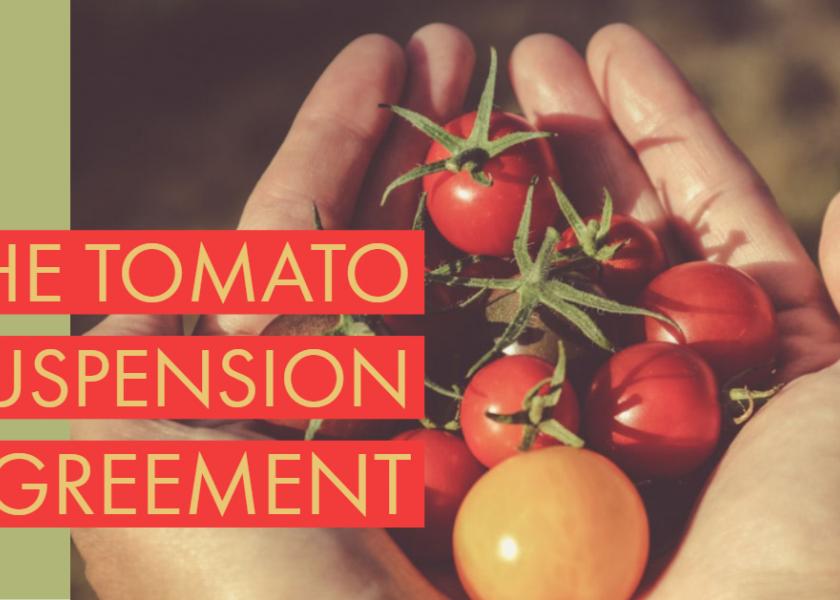Mexican growers express frustration with negotiations

With a hint of possible trade retaliation against U.S. agricultural imports, Mexican authorities and tomato industry leaders have warned that the current proposal from the Department of Commerce to create a new tomato suspension agreement is unacceptable.
Importers of Mexican fresh tomatoes have been paying a 17.56% duty since May 7, when the U.S. Department of Commerce withdrew from the existing tomato suspension agreement with Mexican tomato growers and restarted a dumping investigation that had been inactive since 1996.
In a July 18 letter to Agriculture Secretary Sonny Perdue, Mexico’s Secretary of Agriculture Victor Villalobos Arambula said the Department of Commerce suspension agreement proposal for 100% inspections of Mexican tomato imports would disrupt daily operations at ports of entry.
“(The proposal) has the potential to severely affect trade flows at the border and increase transaction costs to growers and distributors, which will negatively impact consumers,” he said.
Arambula said an examination of records during the past four years finds no significant product refusals for Mexican tomatoes due to quality defects.
“We do not find elements that would justify shipment inspections at ports of entry, as proposed by the Department of Commerce,” he said.
What’s more, he warned Perdue that the precedent of 100% inspections for Mexican tomatoes could lead to similar measures by Mexico for imports of U.S. meats, grains, oilseeds, dairy and other commodities.
The Sinaloa-based Mexican tomato industry group CAADES wrote a July 31 letter to Arambula that negotiations to craft a new suspension agreement have been unfruitful despite 18 months of efforts.
“The United States government has been inflexible with the Mexican tomato producers and brought us to the limit with absurd, even unlawful, proposals,” CAADES said in the letter. The group said one of “those unreasonable proposals” was the provision for mandatory inspection of 120,000 trucks of tomatoes for quality at the border.
Michael Schadler, executive vice president of the Florida Tomato Exchange, said that Mexican growers are “acting as if they are being forced into something against their will.”
“They are an equal party in the negotiations and don’t have to agree to anything the DOC proposes,” he said.
However, Schadler said in an Aug. 2 e-mail that U.S. growers can’t live with another suspension agreement that isn’t enforceable.
“If the Mexican growers and the DOC can’t agree on what that looks like, then the anti-dumping investigation should simply run its full course without yet another suspension,” he said.
CAADES asked the Mexican government to take several actions if the mandatory inspection proposal is not withdrawn with 15 days:
- Inform the U.S. that Mexico will apply quality regulation and conduct inspections on the border for imports of grains such as corn, soybeans, wheat, sorghum and rice; fruits such as apples, grapes and pears; and dairy products, pork and poultry meats;
- Inform the U.S. that Mexico will begin investigations of subsidies relative to U.S. corn, soybeans, wheat, sorghum, dairy products and rice, which CAADES said distort the Mexican market; and
- Inform the U.S. that Mexico will use the same procedures and similar methodologies of investigation used recently by U.S. investigators against Mexican tomatoes.
“We are sure that the resolve of the Mexican government with these actions will be sufficient to make the Commerce Department and the U.S. government change its conduct of continuing to protect with unreasonable measures a handful of producers in Florida, to the detriment of hundreds of thousands of farmers who have their principal source of income in the Mexican market,” CAADES wrote to Arambula.
Schadler said that there is no basis for threats of retaliation by Mexico.
“As we’ve said many times in the past, it would be illegal under the North American Free Trade Agreement and the U.S.-Mexico Canada Agreement for the Mexican government to retaliate against a suspension agreement resulting from an anti-dumping investigation,” he said.
“Retaliation doesn’t logically make sense anyway because a suspension agreement would only come into effect if the Mexican exporters agreed to it in the first place. In other words, this is political posturing to scaremonger other segments of American agriculture to help Mexican tomato producers get a new agreement that doesn’t have any teeth.”
Related articles
Commerce sets preliminary dumping margin of 25% on Mexican tomatoes







